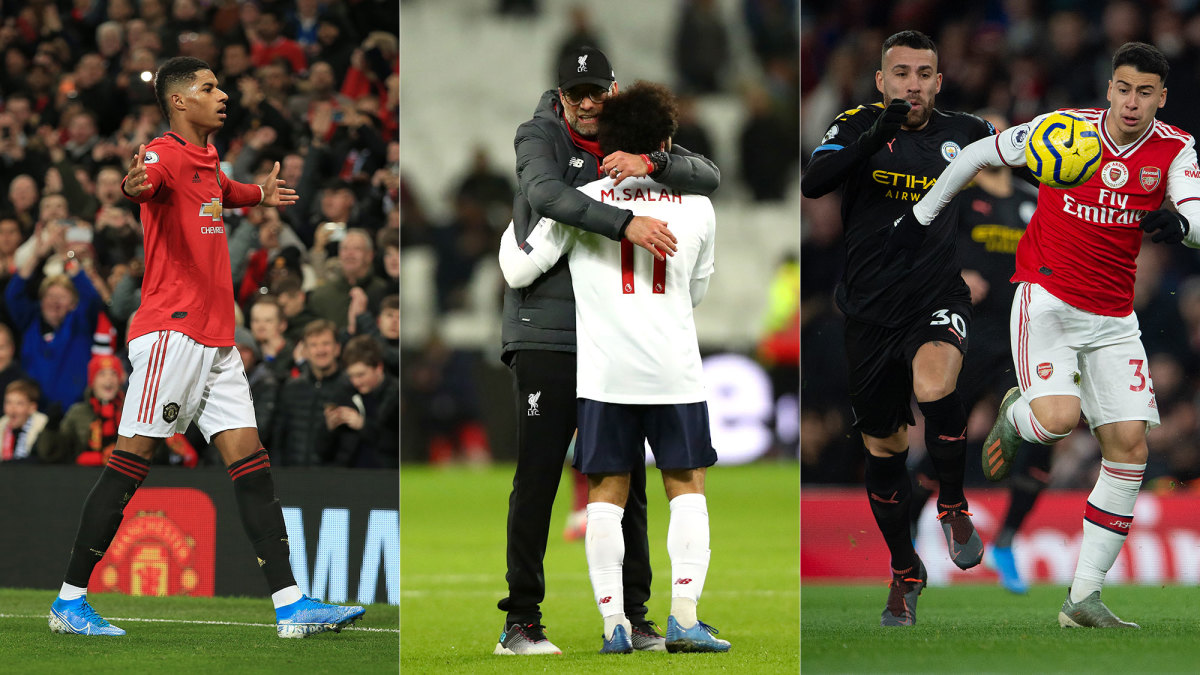The Premier League Picks Up Where it Left Off: An Inevitable Title and Two Intense Races
After the famine comes the feast. On March 9, Leicester City beat Aston Villa, 4-0, and then the football stopped. Some 100 days later, Aston Villa will be involved in the first game of the Premier League's restart as it hosts Sheffield United on Wednesday. Later in the day, Manchester City faces Arsenal, and every side will have played 29 games in the most abnormal of seasons. The weekend features a full slate, and everything in the Premier League will be wrapped up by the end of July before the FA Cup final on the first Saturday in August.
It’s all a little dizzying, particularly given how the various threads of narrative have been dropped. Some sort of “Previously, in the Premier League…” as if it were a TV drama would be extremely useful. Tottenham had not won in six games in all competitions before the shutdown, its chance of Champions League qualification receding seemingly by the week, but perhaps the time off will have allowed the club to reset. It has, at the very least, allowed Harry Kane to heal for matches he otherwise would have missed.
Manchester United, by contrast, thriving after the signing of Bruno Fernandes, had gone 11 games unbeaten before that momentum was halted by the pandemic. Like Tottenham with Kane, Man United now welcomes back a healthy Paul Pogba and Marcus Rashford, with the latter having taken on a remarkable leadership role in helping to feed impoverished children during the crisis.
The two sides meet on Friday in the first major skirmish in the battle for Champions League qualification–although even that comes with an asterisk as Manchester City waits to hear if its appeal against a two-year Champions League ban has been upheld. The Court of Arbitration for Sport is expected to rule on that in the first half of July, at least giving clarity before the season’s end on whether, assuming Man City finishes second, fifth place will be enough for Champions League qualification.
The first issue likely to be decided, though, is the title. Liverpool could win it as early as Sunday, were Man City to lose to Arsenal and then Liverpool beat rival Everton (making it simultaneously the earliest champions ever, by games remaining, and the latest ever, by date). There will, perhaps, be a sense of anti-climax–remember, Liverpool had lost four of its six games in all competitions before lockdown, including being ousted from the Champions League and FA Cup–but no matter how odd the circumstances, no matter how far from the raucous occasion at Anfield its fans might have imagined bringing an end to the 30-year wait for a 19th title would be, it shouldn’t be forgotten just how brilliant Jurgen Klopp's side has been.
If those four defeats were in part the result of fatigue, then the break perhaps makes it more likely that Liverpool will go on to break Man City’s record of 100 points in a single season. It’s entirely reasonable to despair at the financial structures that allow such domination of a league, but that doesn’t alter the fact that the relentlessness of this Liverpool has allowed it to produce football of historic excellence. Others have had similar and greater advantages and have not been anything this dominant.
Should Man City be reprieved, then the Champions League battle would be significantly less intense. Chelsea, in fourth, has a three-point lead over Manchester United, with Sheffield United, which has that game against Aston Villa in hand, and Wolves two points back and Tottenham two points behind that. A couple of wins for Chelsea and some dropped points elsewhere, and the top four could effectively be settled by the end of the month. But if fifth does carry a berth in the Champions League, then even Arsenal, a point behind Spurs, could possibly enter the mix.

At the bottom, Norwich is in major trouble, six points from safety and desperate for a rapid start with home games against Southampton and Everton in the first week. Villa is four points better off and has that game in hand against Sheffield United. If the Premier League follows the pattern of the Bundesliga, and home advantage ceases to be as significant, though, it may consider itself unfortunate. Villa has played at least one home game fewer than everybody other than Man City this season and averages 1.31 points per game at home as opposed to 0.53 away.
Villa trails three teams by two points: Bournemouth, Watford and West Ham. Bournemouth may end up grateful for the layoff given its dreadful injury crisis has at least in part cleared. Watford must fear that the impetus provided by Nigel Pearson’s arrival has dissipated, while West Ham will be bracing for an avalanche of jokes about how the behind-closed-doors atmosphere at the London Stadium barely differs from normal, given how far the crowd is from the pitch and how echoey the acoustics are. Brighton, two points above that trio, could yet be dragged into the race for survival.
The compressed nature of the schedule makes it feel as though the season is nearly done, but there is still a quarter of the way to go. The title race may be as good as over, and the Champions League battle could fizzle out, but the relegation scrap has plenty of time for twists and turns.
At the moment, though, the most significant narrative is simply that football is starting again.
